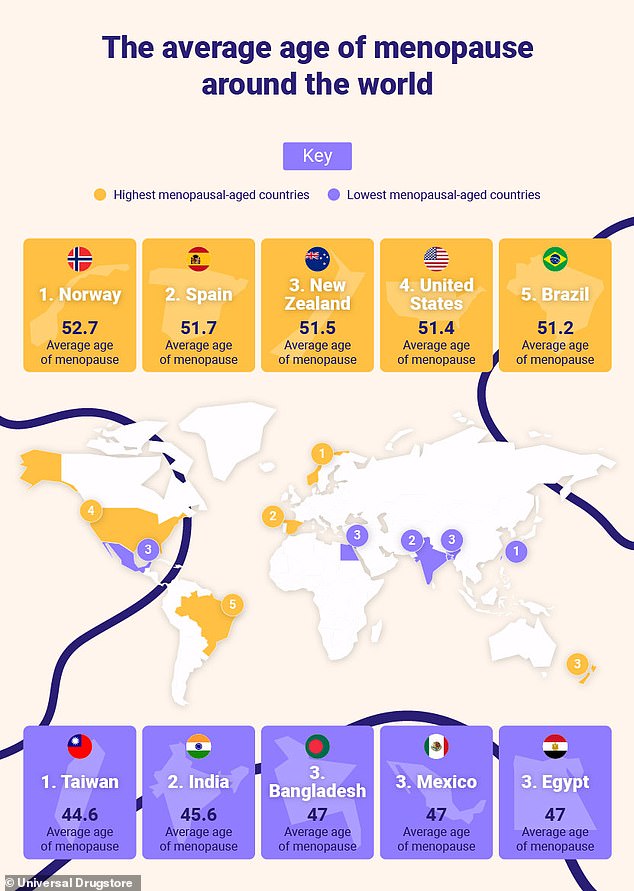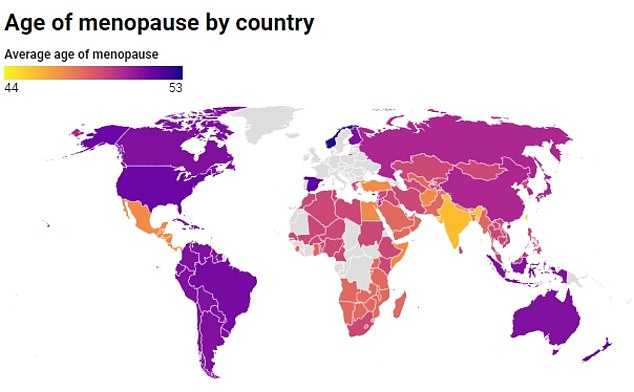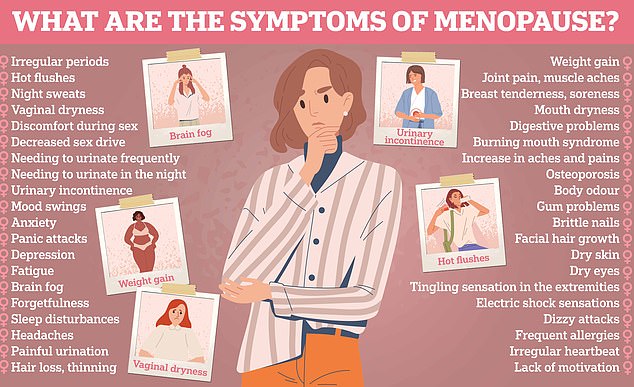Women in the eastern part of the world are experiencing menopause earlier than others around the world.
An analysis by Universal Drugstore looked at the average age at which women go through menopause around the world and found countries with the oldest and youngest women experiencing the transition.
On average, menopause begins at age 51. But women in Taiwan, India and Bangladesh can expect to begin the process in their mid-40s.
With an average age of 44.6 years, Taiwanese women experience menopause at an earlier age. Followed by India with 45.6 years and Bangladesh with 47, outliers among Asian countries.
Countries where women experience the process at an older age include Norway at 52.7 years, Spain at 51.7 years, and New Zealand at 51.5. With ages of 51.4, 51.2 and 51 years, they are closely followed by the United States, Brazil and the United Kingdom, respectively.
There are some geographic trends among the data. Many countries in South America have an average age of menopause of 51 years, while in Africa, many countries have an average age of 48 or 49 years.
In Asia, the average age of menopause in most countries is 49 or 50 years.
The World Population Organization said better health care and broader access to it generally correlate with a higher age at menopause.
Menopause can bring hot flashes, irritability and anxiety (file photo)
However, in lower socioeconomic countries, where access to healthcare is more limited, women tend to have children younger, which may contribute to earlier menopause.
But experts told DailyMail.com that more research is needed to determine how geography, culture, diet or socioeconomics play a role in menopause.
Dr Amanda Shea, chief scientific officer of Clue, an app that tracks periods and ovulation, told DailyMail.com: “The timing of menopause is influenced by a multitude of things, including genetic, biological, environmental and socio-economic factors. .
“For example, research has found associations between age at menopause and factors such as smoking, obesity, childbirth, and nutrition.”
Menopause is a natural biological process that marks the end of a woman’s menstrual cycles and fertility.
Worldwide, the average age of menopause is between 44 and 53 years.
Signs include irregular periods, hot flashes, and mood fluctuations that cause irritability, anxiety, or depression.
Women in menopause may also have vaginal dryness, sleep disturbances, weight gain, and changes in skin or hair color.


Symptoms can begin up to 10 years before menopause and can last up to 14 years. However, the average duration of symptoms is about seven years.
Treatment options include hormone therapy and lifestyle changes, such as limiting saturated fats and eating more fruits and vegetables.
In the analysis, the five youngest countries are completed by Mexico and Egypt, which also have an average age of 47 years, according to Droguería Universal. analysiswhich was based on data from the World Population Organization.
Dr Shea added: ‘…trends in the onset (of menopause) vary by country and change over time.
“These variations highlight the critical need for more research to better understand the underlying factors driving these trends and their implications for the daily lives of women and people with cycles, especially as life expectancy increases and we spend more years in menopause.”
Dr Navya Mysore, medical director of women’s health at Nurx, a women’s healthcare company, told Daily Mail.com: “It’s difficult to say whether geographical trends, genetics, diets and cultures affect the age of onset of menopause. The fact is that we need more research to better understand the condition in different cultures and ethnic groups.
‘We know that some ethnic groups experience menopause differently than others. For example, many Japanese women experience fewer hot flashes than other races and ethnicities.
“This could be because Japanese women’s diet may contain more soy,” he added.
Soy contains isoflavones, a type of plant-based estrogen that mimics the hormone produced naturally in the body. Menopause (and the hot flashes that accompany it) begin when the body stops producing estrogen.
This, Dr. Mysore suggests, may be why women who follow soy-rich diets experience fewer menopause symptoms. However, he cautioned, there is limited data to confirm this.

Regardless of the cause, Dr. Shea said both early and late menopause have “important health implications.”
She told this website: “For example, premature menopause is associated with an increased risk of cardiovascular disease and hypertension, while delayed menopause is associated with an increased risk of breast, endometrial and ovarian cancer.”
Premature menopause is also known as primary ovarian insufficiency (POI) and occurs when a woman’s ovaries stop functioning and she experiences menopause before age 40, while early menopause is when the transition occurs between ages 40 and 45.
Early menopause occurs in approximately five percent of women and PDI occurs in only one percent of women under 40 years of age.
It could be the result of genetics or family history, as well as certain diseases or treatments, such as cancer and chemotherapy, removal of the uterus or ovaries, and certain autoimmune diseases.
Investigation has shown that the long-term health impacts of premature menopause include heart disease, neurological diseases, mood disorders, osteoporosis, and premature death.
However, a separate study It has been found that hormone therapy can reduce some, but not all, of these risks.
This includes taking medications that contain the female hormone estrogen, which the body stops producing when a woman experiences menopause.
In contrast, delayed menopause occurs when a woman reaches menopause between ages 50 and 60.
Genetics, obesity, having children, and pregnancy late in life can all contribute to delayed menopause.
A 2014 study Delayed menopause has been found to be associated with an increased risk of breast, endometrial and ovarian cancer; but also, a lower risk of osteoporosis and death from heart disease, and a longer reproductive lifespan.
Regardless of trends or patterns, Dr. Shea said more research is needed “to better understand the factors that contribute to these differences.”
“In particular, improving our ability to predict individual experiences of perimenopause and menopause based on a person’s unique characteristics and circumstances could allow more women to better prepare for and manage health changes over time, ultimately improving their overall quality of life.


